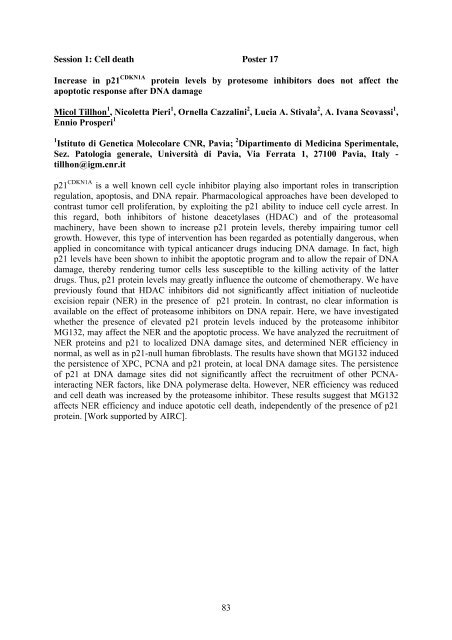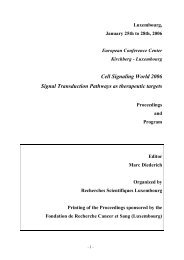Abstract book (download .pdf file) - Redox and Inflammation ...
Abstract book (download .pdf file) - Redox and Inflammation ...
Abstract book (download .pdf file) - Redox and Inflammation ...
Create successful ePaper yourself
Turn your PDF publications into a flip-book with our unique Google optimized e-Paper software.
Session 1: Cell death Poster 17<br />
Increase in p21 CDKN1A protein levels by protesome inhibitors does not affect the<br />
apoptotic response after DNA damage<br />
Micol Tillhon 1 , Nicoletta Pieri 1 , Ornella Cazzalini 2 , Lucia A. Stivala 2 , A. Ivana Scovassi 1 ,<br />
Ennio Prosperi 1<br />
1 Istituto di Genetica Molecolare CNR, Pavia; 2 Dipartimento di Medicina Sperimentale,<br />
Sez. Patologia generale, Università di Pavia, Via Ferrata 1, 27100 Pavia, Italy -<br />
tillhon@igm.cnr.it<br />
p21 CDKN1A is a well known cell cycle inhibitor playing also important roles in transcription<br />
regulation, apoptosis, <strong>and</strong> DNA repair. Pharmacological approaches have been developed to<br />
contrast tumor cell proliferation, by exploiting the p21 ability to induce cell cycle arrest. In<br />
this regard, both inhibitors of histone deacetylases (HDAC) <strong>and</strong> of the proteasomal<br />
machinery, have been shown to increase p21 protein levels, thereby impairing tumor cell<br />
growth. However, this type of intervention has been regarded as potentially dangerous, when<br />
applied in concomitance with typical anticancer drugs inducing DNA damage. In fact, high<br />
p21 levels have been shown to inhibit the apoptotic program <strong>and</strong> to allow the repair of DNA<br />
damage, thereby rendering tumor cells less susceptible to the killing activity of the latter<br />
drugs. Thus, p21 protein levels may greatly influence the outcome of chemotherapy. We have<br />
previously found that HDAC inhibitors did not significantly affect initiation of nucleotide<br />
excision repair (NER) in the presence of p21 protein. In contrast, no clear information is<br />
available on the effect of proteasome inhibitors on DNA repair. Here, we have investigated<br />
whether the presence of elevated p21 protein levels induced by the proteasome inhibitor<br />
MG132, may affect the NER <strong>and</strong> the apoptotic process. We have analyzed the recruitment of<br />
NER proteins <strong>and</strong> p21 to localized DNA damage sites, <strong>and</strong> determined NER efficiency in<br />
normal, as well as in p21-null human fibroblasts. The results have shown that MG132 induced<br />
the persistence of XPC, PCNA <strong>and</strong> p21 protein, at local DNA damage sites. The persistence<br />
of p21 at DNA damage sites did not significantly affect the recruitment of other PCNAinteracting<br />
NER factors, like DNA polymerase delta. However, NER efficiency was reduced<br />
<strong>and</strong> cell death was increased by the proteasome inhibitor. These results suggest that MG132<br />
affects NER efficiency <strong>and</strong> induce apototic cell death, independently of the presence of p21<br />
protein. [Work supported by AIRC].<br />
83




